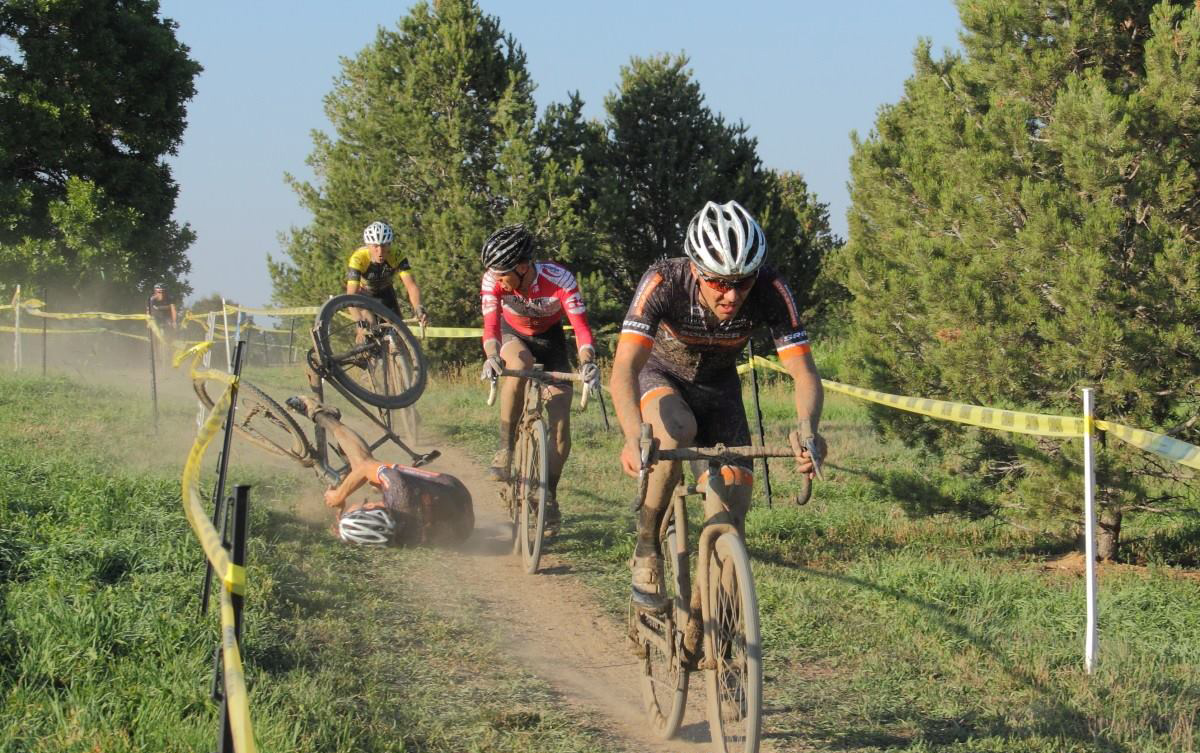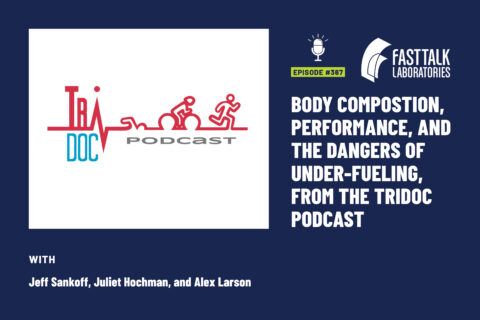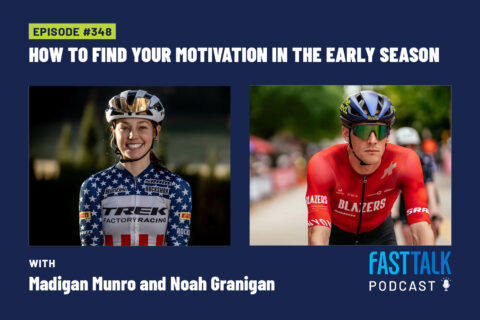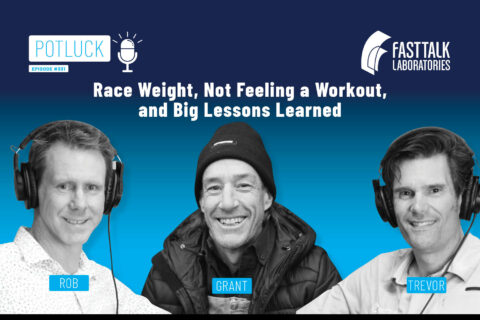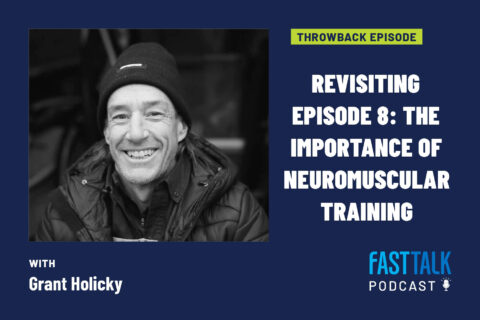We provide the psychological tools that will help both with uncertain circumstances in life (like a pandemic) and with addressing the emotional rollercoaster that is bike racing.
Episode Transcript
Chris Case 00:05
Welcome, everyone to Fast Talk. I’m your host Chris Case. It goes without saying that we are living in a time defined by disruption, loss, disappointment, confusion, and far too much uncertainty are everywhere. I think it’s safe to assume those emotions are also universal. Each of us has been impacted by the current pandemic in small and all too frequently, large ways. And at first, it probably isn’t entirely apparent that these same emotions are everywhere in cycling. We deal with defeat. We deal with uncertainty, disappointments, setbacks, injuries, and we deal with loss all the time. In fact, we do so at almost every race we compete in. Even the winningest cyclist of all time, the epitome of a champion Eddy Merckx lost far more than he won. Our guest today is Julie Emmerman, a clinical sports psychologist with extensive experience working with professional cyclists, NHL players, MMA fighters and everything in between. Julie recently appeared on the show in Episode 102. And it goes without saying today, I’m at home, Trevor’s at his home and Julie’s at her home. In today’s episode, we address how to effectively and constructively deal with the emotions of loss on certainty, defeat disappointment. The lessons will of course help both with dealing with the uncertainty of a pandemic and with addressing the emotional rollercoaster that is bike racing. We delve into dealing with anxiety and developing coping mechanisms to stressful times and events. Returning to routine after great change setbacks and injuries, creating challenges for motivation, satisfaction, and mental well being and much more. Next week with the help of Dr. Stephen Siler exercise, physiologist extraordinare we’ll discuss ways to properly adjust your training. But today, focus upstairs on the mind. So let’s take it slow in these challenging times, in hopes that soon we can all get back to going fast.
Chris Case 02:23
Thanks, Julie, for being available in this strange time.
Julie Emmerman 02:29
It is great to be back not under these circumstances. But thank you for having me back.
Chris Case 02:33
Certainly. And I know we wanted to really talk about the things that people can do to adjust their mindset or really just cope with the current situation in the world. And I think sometimes we’ll talk about that, and it will very naturally feel like we’re talking about the general situation. But I also think what’s cool is that a lot of the things we’ll talk about today can be applied to people’s mindset and attitudes and psychology when they’re performing as athletes or in their training or dealing with certain setbacks within the athletic context.
Julie Emmerman 03:20
Yes, I agree. There’s a lot of carryover for sure.
Chris Case 03:22
As a psychologist in this time right now, have you been hearing from a lot of athletes that you work with, or even just friends that are asking you for, for help for dealing with loss, dealing with uncertainty dealing with disappointment at the race season being completely crushed at this moment? And in this state of unknown? There’s so many unknowns right now.
How to Adjust Your Training During the Time of a Pandemic
Julie Emmerman 03:52
Yes, I I have been hearing from people, whether they’re clients or friends, family, I think we are all, you know, kind of reaching out to one another at this time, because it is such a time of uncertainty that we’ve never really had to encounter before. And I think that level of uncertainty is unparalleled. And people are struggling because we all like a certain amount of predictability in our day to day, in particular with athletes. I have been talking about the disappointments that they’re experiencing, whether it’s around the Olympics, or various races that they were aiming for, or various events, and, and just the overall sense of loss around. Wow, I’ve been putting so much energy and attention on these things, especially given it’s an Olympic year. And now that seems to all be in question. So naturally, that raises people’s anxiety and their sense of fear, a sense of purpose. And so that yes, people are asking a lot of questions and just trying to cope as best as we all can.
Chris Case 04:52
And I also turn that question over to Trevor really, I know you’re still coaching some athletes and perhaps Many of your questions are more towards the Well, how do I adjust my training? But I know that you take the mental side of training very seriously. So how have you been? What are the conversations been like with some of your athletes around mindset and dealing with this just this huge disruption?
Trevor Connor 05:17
I’ve had this conversation with every one of my athletes, and it’s been different with every single one of them. There is no one solution to this. I think it’s a combination of what were their goals, where are they at in their season, and each individual I have one athlete who’s extremely concerned about this, I gave her some workouts for the weekend, kind of give her a stress relief, and she went, that’s going to weaken my immune system, I can’t do that. I have another athlete who he works in the stock market last couple of weeks have been really bad for him, he called me up, he’s like, strike me this weekend, please, I need to go do something. I was kind of have that mindset myself. I do think there is a right now a therapeutic side to the cycling. I myself yesterday, we’re climbed up into the mountains, the weather report was sunny. So of course, by the time I got to ward, it was snowing really hard. And I remembered back to Christmas, which was a much happier time, what 25 years ago. And just put on Christmas music biked into the snowstorm, I went, this is what I needed.
Chris Case 06:37
Christmas in March.
Julie Emmerman 06:40
Yes, I think that, um, you know, as a pandemic, by definition, we are all in this, and we are all experiencing it. And there are certainly commonalities of what we are experiencing. And I do think that it is important to give each person that we have a touch point with time and space to air out how they personally feel affected, because I know, a lot of people don’t really feel like it’s legitimate to talk about something like even the Olympics, given that, you know, so many thousands of people are dying. And I think there are ways to certainly navigate conversations where there is sensitivity to the realities of what’s going on, as well as give a respectful space for people to talk about how they personally feel impacted, and how they want to cope with that.
Coping Mechanisms for the Anxiety During the Pandemic
Chris Case 07:24
I’d like to sort of dive a little bit deeper into the issue of anxiety here of being adaptable to the moment and discuss some of those coping mechanisms that you wanted to discuss. Julie, do you want to address that head on?
Julie Emmerman 07:42
You know, one of the reasons I I felt strongly about trying to offer people, your listeners something constructive is because I recognize there is so much uncertainty out there. And people are struggling with a sense of purpose, and so on. And to piggyback on to the last podcast that I did just a few weeks ago, where we touched on resilience, it seemed like a perfect opportunity to expand on that. Also, in that podcast, I was mentioning that really life is never a straight line. And most of us are as an adult, usually we have experienced that at this point. And life is filled with some degree of tension almost always, and things are always changing. No one could foresee the ways in which things have changed just in you know, short weeks time. But nevertheless, they have. And so by definition, our patterns and routines are disrupted, there has been so much loss, whether it’s financial, or in terms of your goals, as we were just mentioning. And so now is a time where it you know, how do you find that resilience? And what can people do to find that resilience. I think it’s very important for people to be able to tolerate some of the harder emotions that come with life experience. Sometimes things don’t work out how we hope they will sometimes, no matter how much we try, and how much effort we put in, there is just a certain amount of control, we do not have and we’ll never have over our lives. It’s a fact that people don’t like to face as it’s early because we like to think of ourselves as being able to control nearly everything. But at this point in time, it’s never been more clear to most that something is invisible as a virus can just, you know, literally bring the world to a halt. Where resilience is the back end. That means there’s been some kind of loss, some kind of disappointment something is either fractured or broken and we are looking for ways to rebuild. I think it’s very important to recognize for yourself or for your family and loved ones. What are where are those losses coming from? What are the things that are causing you the most stress at this point in time and to try as best as possible to be self soothing, or seek soothing from other people around those things that you’re experiencing. After one is able to kind of come to grips with their pain then, you can start to rebuild. But it’s very hard to rebuild. If you don’t first just try to give respect to those things that you’re feeling that are causing you pain in the first place.
Chris Case 10:10
Would you have people literally write some of these things down? Because, you know, a lot of people might hear what you’re saying and say, “Oh, I know what the loss is I can race my bike anymore.” Or they might they might casually have the thoughts around what loss means or identifying what disappointment they have. But would you actually encourage people to sort of write things out to give a
Julie Emmerman 10:36
Sure.
Chris Case 10:36
-little bit more impact to them?
Julie Emmerman 10:39
I think that’s a great idea. I think journaling about anything right now is a great idea whether there that means people, some people prefer to write in full sentences, and some people doodle their thoughts or whatever it is, I do think it’s a good idea to flush it out in writing somehow, or, and or talk about those things with others in your life in your life.
Should We Try and Keep a Routine in a Time Like This?
Chris Case 10:59
What about the notion of trying to keep a routine that is familiar in times like this? How does that play into resilience?
Julie Emmerman 11:11
Sometimes, as a psychologist, we are looking at people’s adherence to the routine and wondering if it’s overly rigid or compulsive. And I think in this scenario, it’s important to normalize and let people know that routine is more often healthy than that, in terms of your day to day activities. So what I mean by that is, if people are used to at eight o’clock I go have coffee 8:30am at work, or whatever your day to day pattern is. And now all of that has been up ended. The first way to take back some sense of control, when you feel very little control is to look at what are the things in your day that you can still have impact on? What are the routines that you can still have that are familiar and do-able? And where do you need to be adaptable and open to establishing a new routine?
Chris Case 12:03
And to bring this back maybe to an athletic context? This is one of those skills where you could say, okay, it sounds like you’re talking about Coronavirus right now, but if you think about it, say you’re injured and can’t you can’t get on your bike. But you do want to sort of build the resiliency within you to to have a more positive outlook on things you want to get back into a routine. So that that is a beneficial part of what we’re talking about here. Whether it’s injury or a sort of a mood issue, if you will, after a devastating defeat or something like that. It’s, that’s that’s how you can apply this in a more athletic sense, if you will.
Julie Emmerman 12:54
Exactly, exactly. And most people do, you’ve suffered any setback. And hopefully, if you encourage yourself to be resilient by finding what you can do, versus focusing on what you cannot do, it’s really important to have that sort of can do attitude as well as a creative mindset to problem solve, especially now when we might feel pretty limited compared to what we’re used to.
Chris Case 13:18
And I guess simultaneously here, as I’m looking through some of the thoughts that you had sent to me, before we discussed or before we started recording, I should say. There’s the routine side of things here, which we’re saying in times like these are is quite beneficial. There’s also some caution when it comes to comfort zones. You don’t want to overdo the things that might lead to setbacks, whether that’s too much eating or too much drinking or too much of these other things that in times of uncertainty will bring you comfort, but can be overdone.
Julie Emmerman 13:58
Typically in situations like this, when people feel a loss of control, you’ll see a range of responses from you know, sort of a surrender, throw your hands up in the air, and just oh, you know, throw everything out the window, and why don’t we just keep eating everything or, or yes to a lot of overconsumption. And then you’ll see on the other side of the spectrum extremes where people will just launch themselves into some hyper activity that seems very rigid and inflexible. And that’s their attempt to deal with circumstances that they feel are beyond their control. So whatever your default pattern is, it’s important to just try to notice it, be aware of it and then ask yourself, you know, is this really helpful for you right now, will this be helpful for you in the long run? And it is somewhat typical, where you’ll see people maybe initially delve into a comfort zone in the face of a threat like this, and then even out and be able to kind of pick themselves up by their bootstraps as the expression goes, and return to some normalcy or whatever normalcy they can experience at that time. Watching out for some catastrophic thinking is important. Being able to recognize where you might have negative or distortions in cognition, that are just false beliefs. So for example, the entire fear of running out of toilet paper, this is an example of people’s distortions, cognitively, it, or you know, buying up all this water when water is not what we are threatened to buy right now, we’re not we’re not at risk of having our water be contaminated. So in your responses, it’s important to recognize those things. And part of doing that is recognizing where your emotions and impulses might be getting the better of you.
How Can Athletes Deal with the Pandemic?
Chris Case 15:48
Could you bring this back again, to the athletic context, and help us understand how this could be applied in in training or competition?
Julie Emmerman 15:57
Yes, I think this absolutely is something that athletes experience quite often. Because anytime there’s an injury or any kind of setback, it’s really crucial that that person doesn’t see themselves as a victim. And oftentimes with victim oriented thinking, there are those cognitive distortions. But an athlete will gravitate towards having a growth mindset, and seeing things as an opportunity. And then positioning themselves in a way that allows them to set themselves up for success given the opportunities that are available. And there will be a commitment to various acts aspects of their life with respect to training. And so then that sort of engendered a positive momentum with a good outlook for the future.
Trevor Connor 16:49
One of the things I’m doing with all of my athletes, as I said, this, the solution for each athlete has been different. But the one commonality is first exactly what Julie said earlier, which is let everybody deal with the loss in their own way. Your loss is something we see in sports all the time, and everybody handles it differently. And it is important to to come to a reckoning with the loss. But then I personally very quickly tried to move my athletes towards looking ahead. What’s if you think about it simply if you’re injured, if you’re dealing with what we’re dealing with right now. Now kind of sucks. Look ahead, set a, what I do with my athletes is I set a future goal. So the the races they wanted to do in April aren’t a reality right now I have the same thing. I want to have a really strong March and April season. And I definitely had to deal with losing that. But first thing I did for myself is go, okay, what are the races I’m going to target now. And I redesigned my season around August and September. With each of my athletes, I sat down and said what do we want to target now? What are the the new goals and for some of them, that was races later in the season. For some other they went, well, I don’t really have an event. Now the one I really want to do this year doesn’t exist. So we set different priorities for the season. Maybe this is a season that we focus on really building their level, so they can have a great year next year, but just getting them to latch on to something that they can build toward so that they can work towards a new goal
Chris Case 18:28
And I and I’ve actually seen some some inspiring pieces from professional athletes online that I think can be applied to all of us. And that is, you know, their livelihood is racing their bikes. And they can’t do that right now. But they’ve been sending out the message. And in particular, I’ll give a nod to Payson Mcelveen who was on that episode with Julie Episode 102. And he’s really pushing people to not take this opportunity to binge watch Netflix, but to set goals right now to do something whether that’s learn a new skill, whether that’s to get fit inside your house in different ways. Hey, maybe you aren’t the guy that is like Trevor, and you don’t do your weights. Well, maybe now’s the time to take up a routine like that. Or, you know, maybe you just need something totally distracting. And so you take up knitting, but whatever it is setting short term goals that just happened to be different from what you had on the calendar is also I think, a very positive thing and will help you feel a sense of accomplishment right now. Even though you might be indoors much more than you had thought you would be or or hope to be.
How Can we Find Motivation in a Time Like This?
Julie Emmerman 19:38
I have been hearing from people who are also questioning how they can find motivation. Because given the state of the world, you know, bike racing seems to lack now a sense of purpose, and so they are feeling less motivated to take care of themselves from a training perspective, because, you know, what does it all matter when this is seriously serious, and people are dying. So towards that end, I agree with you, Chris, that it is really important to look for things right now day to day that you can feel good about that you can, it gives you a sense of self agency that you feel somewhat challenged by, that can offer that sense of satisfaction just day to day because we don’t know. We don’t know, when we can race. We don’t know when we can do this. We don’t know when we can do that. And that’s quite unsettling. But if you can narrow your focus and think, okay, well, what are the things that I can do? That can give me a sense of purpose, or one of the things that can give my life meaning right now? Sure, the focus has shifted. But I think a lot of people will find themselves surprised at how adaptable they are.
Chris Case 20:58
Yeah, and and last night, when we spoke, Julie, before we decided exactly what we wanted to talk about today, you had mentioned that there’s some a body of research. And again, I’m not trying to make light of the situation here or make a connection between these two things that I’m going to draw parallels between, but I think it it is an interesting anecdote, and that is, the research you were referring to was with POW’s people that have spent time in solitary confinement. And again, I’m not saying that what we’re going through right now is anywhere near that. But it’s in those populations of people. Those who used creativity, who set challenges for themselves in those extremely challenging and harsh conditions, came out the other end with better psychological, emotional outcomes.
Julie Emmerman 22:02
Yes, it has been a while since I have visited that literature. But certainly people that were able to create challenges for themselves fared better psychologically after, for example, solitary confinement, people that kept in mind their personal and collective goals, fared better. People who are able to utilize a sense of humor, and utilize their faith, keep a positive outlook on the future, even if they may not be a part of that future, trying to, to remember, life is greater than them as an individual, but seeing a bigger and broader picture. And trying to always remember to have gratitude. And these are people that do tend to fare better after extreme situations, and not coincidentally, those are also the characteristics of somebody who’s resilient.
What Makes a Person Resilient?
Chris Case 22:57
So yeah, getting back to that element of resilience. What else can you tell us about what makes a person resilient?
Julie Emmerman 23:09
A characteristics of somebody who is resilient include somebody who is able to view change as impermanent. So if you’re experiencing a negative change, or a positive change, just remembering that things are always in flow in a flux. And people who can reframe, to see things as opportunities, people who are aware of and can catch themselves in cognitive distortions, and people who are able to manage strong emotions and impulses, people who can focus on events that are within their control, people who choose not to see themselves as victims, people who are action oriented and thoughts and behavior, people who are able to commit to various aspects of their lives to make those areas proceed forward in various ways that are available at the time. Again, a positive outlook on the future, using, faith, humor, remembering to surround yourself as much as possible with positive minded people. Um, and to have patience.
Chris Case 24:12
Yeah, and I think that that it is very clearly a process. For some people, they might have learned to get to that point more quickly. For others, it will take a bit more work, they might need some help, they might need some coaching.
Julie Emmerman 24:30
I recognize that I have mentioned the use of humor as a positive coping mechanism to encourage resiliency and I just want to also let people be aware that it is important to be sensitive to people are experiencing different things at any given time. And so be careful with how you share what you find funny and what you find funny because you never know if somebody is struggling with the loss of a loved one or someone who is threatened. We all have parents most of us know people who are elderly, people who are at risk. And so with some of the funny things going around, I just think it’s important to be sensitive to that because everyone’s in a different place. Now, I think it’s a great time to actually be open and realize, or just recognize how other people are handling it, and what can you bring into your own life that might be helpful. For example, I see a lot of creativity online, people doing different dances and funny things, I see families developing little exercise circuits in their backyard for those that are able to be outside. And just different creative means of staying occupied.
Chris Case 25:43
Now, again, like I said, at the top of the show, a lot of these things that we talked about today in this context, in the context of a world, completely disrupted by the Coronavirus, you can look at these things and say, “Okay, that makes sense. But I’m an athlete,” But you just have to place yourself in a context where all of these things are applicable to gain a lot from what we just spoke about.
How the Pandemic Effects Introverts and Extroverts Differently
Julie Emmerman 26:11
So one of the things that fascinates me about this time period is how it affects people differently, whether you are introverted or extroverted. And though I don’t think there is an algorithm that exists to measure this, I do think that people naturally find themselves in a routine in their day to day life, where you have a good mix that works for you. So if you’re mostly introverted, but you’d like a little bit of social time, most people are able to kind of carve out a way of living that suits their needs. And right now, extroverts have so much less control over how they’re getting their needs met. So I think it’s important to recognize that much like an introvert will feel absolutely exhausted after like a three day conference where they’re surrounded by hundreds of people. Right now, the extroverts are probably a lot more uncomfortable than introverts. I know some introverts who joke about, you know, kind of welcoming the social distancing. And extroverts are struggling. So I think I would just like to encourage extroverts to be creative in reaching out to others using whatever technology they can to connect.
How to Get Creative and Modify Training in a Time Like This
Chris Case 27:19
And that might be a great way to segue into what I thought we should talk about in the second half of the show, which is getting creative right now with your training. And not only getting creative, but understanding how to modify it to deal with the current situation. So perhaps we can dive into that.
Julie Emmerman 27:41
Yeah, that sounds good. I think, regarding exercise, and from what I’ve seen, a lot of the coaches have been suggesting similar things like dialing down intensity, keeping exercise going for the physical and mental health benefits. And I’m sure Trevor can speak more to that.
Trevor Connor 27:59
I think another really important thing that we need to recognize is the timing of all this for cyclists. And yes, we can say, they’re much more important things going on right now. But it’s still important to recognize what’s going on in our own mindsets. And the fact of the matter is, I’m personally experiencing this. I know all my athletes are experiencing this. And I think a lot of cyclists are experiencing this where we’ve spent months and months and months doing our base work, getting prepared for the season making all the sacrifices so that we can be strong. Come March and April and the season starts. And unfortunately, now that we’ve done all that work, we’ve done all that preparation, the seasons been pulled out from underneath us, and you can try to brush that off. But I think for a lot of athletes, there is a real sense of loss there of all this work I did has just gone out the window. And I do think that’s important to recognize.
What Tools or Technology can Help People Cope During this Pandemic?
Chris Case 28:55
Julie, are there any tools out there that people can use in this modern world with technology to help them deal with a situation like this?
Julie Emmerman 29:04
Yes. And like anything else, the technology can be used in both positive and negative ways. So before I answered your question directly, I just want to really discourage people from sitting in front of TV and watching the news endlessly. And I especially want to discourage people from spending hours and hours on social media because it’s fascinating. And gripping is what’s happening across the world is statistically we know that social media tends to raise anxiety much more so than traditional media. That being said, it’s also important to be discerning in traditional media so that you can try to determine as best as possible that you’re getting accurate information. So for the for as far as establishing routine and trying to take control over things. I think it’s important to recognize how much time you might be spending and try to reduce that because most people are probably spending too much time following the news and avoiding the rest of life that can simultaneously be happening. Other things that people can do, as far as creating possibly a new routine, are using some apps to help with just their mental well being. So Headspace is a wonderful app, especially for athletes, there’s another app called Calm. And there’s a variety of sleep apps out there that might also be helpful for people at this time. Another thing that people can do to just try to reduce anxiety during a time like this, it might sound hokey, but actually just using tactile things can be very effective at helping to self soothe. So for example, holding something comforting like a puppy or your dog or you know, even holding your partner’s hand or holding something that is just associated for you with comfort can be helpful, during times where you feel like your anxiety might be spiking. You can also just try to surround yourself with comforting smells, lavender is shown to be in effective, anxiety reducing type of it has an anxiety reducing effect on people. There’s visuals that can also be calming and soothing. There’s auditory cues that can be soothing, such as nature sounds, various music, certainly, comfort food is that called comfort food, for no reason. There’s lots of things like chocolate that people tend to go to. And I would obviously encourage that in moderation. And then again, exercise is hugely important for helping us to regulate our moods. I would also encourage people to, again, utilize people around them. That being said, I would encourage people to also consider that everybody around you is going through the same thing in various ways. And so people’s moods will have maybe a little bit more reactivity than you’re used to, and just try to afford everybody around you a wide birth. Because one minute maybe somebody is feeling okay about things. And then a couple hours later, they’re feeling depressed. So just try to afford everybody around you a bit more grace, especially if you are living with or know people who are on the front lines in the medical community.
Chris Case 32:18
Hmm. Very good thoughts. Yeah, I’m guilty of half of the things you just mentioned.
How to Not Just Sit Around During Quarantine
Julie Emmerman 32:24
The other thing that I just want to emphasize too, is a lot of people are complaining that they’re bored. And I would just encourage you to try to find purpose in something that you’re doing. And I know for myself, it’s a, it’s been a helpful time to catch up on things that I usually feel like I can’t really get to because other things will then fall behind. So I’ve been challenging myself to learn new computer skills. Some people might challenge themselves to pick up a guitar, some people might challenge themselves to teach their kids a various skill or language, for example. And so just try to be creative with learning something and challenging yourself. These are all good ways to just try to make the best of the situation. I decided last week that I was going to undertake what seems to me unfathomable, which is weaning myself off of caffeine.
Chris Case 33:13
Mmmhmmm.
Julie Emmerman 33:13
And yes, I know. And it’s like summiting Everest. But so I have an episode last week where I was sick. And I did get tested and I was negative. Fortunately, um, but after getting sick, I realized I hadn’t had any caffeine and a few days. And it didn’t seem painful at the time. So I was just going to go with it. And it had been on my mind for a while to get off caffeine for a little bit because I have a pretty serious caffeine addiction. And I decided no better time than now. So I just been drinking decaf. And actually, it’s been going pretty well.
Trevor Connor 33:50
I am impressed.
Julie Emmerman 33:51
I have to say I’m impressed too. I didn’t think I could do it.
Chris Case 33:55
Well, I know some mountain nears and they actually say climbing Everest is actually pretty easy. There’s there’s other mountains that are much harder. Julie.
Julie Emmerman 34:05
This is true. It’s true. But I I would love to know what challenges you guys might take on?
Chris Case’s Quarantine Challenge
Chris Case 34:11
Well, as I referred to earlier, I’ve sort of taken upon myself to give my give myself a running challenge and I’m trying to set a mile PR time. I was much better runner in high school. So to get back to that level at the age of 42 is-is quite a challenge. It’s a physical challenge. It’s not anything more than that at this point. I should probably come up with a non-physical challenge to to complement that. But yeah, I’m gonna try to set a mile PR.
Julie Emmerman 34:44
That’s great.
Chris Case 34:46
Trevor, what about you?
Trevor Connor’s Quarantine Challenge
Trevor Connor 34:48
We’re starting up to new businesses. We’ve moved offices. I’m trying to fold up my place and Toronto. Pretty much all the life is new challenges right now. So I’m actually not trying to add too many to the mix.
Julie Emmerman 35:05
Got it.
Chris Case 35:06
On top of that you’re locked out of your own country.
Trevor Connor 35:08
I am locked out of my own country. That is correct.
Chris Case 35:17
That was another episode of Fast Talk. As always, we love your feedback. Email us at fasttalk@fasttalklabs.com or call 719-800-2112 and leave us a voicemail. Subscribe Fast Talk on iTunes, Stitcher, Spotify, SoundCloud, Google Play, or wherever you prefer to find your favorite podcast. Be sure to leave us a rating and review. The thoughts and opinions expressed on Fast Talk are those of the individual for Julie Emmerman, and Trevor Connor, I’m Chris case. Thanks for listening!

